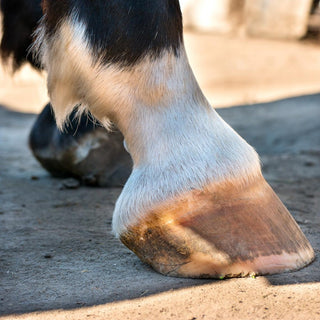Exploring the Benefits of Biotin for Horses: A Supplement for Equine Hoof Health
What is Biotin?
Biotin, also known as Vitamin B7, is a crucial nutrient in equine nutrition and health. It is well known for its role in improving the condition of a horse’s hoof, hair, and skin. While horses produce some level of biotin naturally in their hindgut, additional supplementation can offer numerous benefits.
Biotin is a water-soluble vitamin, part of the Vitamin B complex. It's essential for overall health, affecting everything from energy metabolism to the growth rate of the hoof. In the equine world, biotin is most often associated with hoof care, as it's important for hoof horn growth and hoof quality.
Biotin is naturally found in many types of forage that horses eat. However, the levels of biotin in a horse’s diet may vary depending on the type and quality of the forage. In many cases, horse owners opt for supplemental biotin to ensure their equine friends are getting enough.
Benefits of Biotin & The Role of Biotin in Healthy Hoof Growth
Though biotin deficiency is rare in horses, adequate biotin is important for hoof health, supporting the new hoof horn's growth rates and hardness. The amino acids methionine and zinc, along with biotin, are key components that support hoof structure.
Supplemental biotin has been shown to improve hoof growth and hoof quality. Studies have reported greater growth rates and hardness in hooves following biotin supplementation (Reference: Equine Veterinary Journal). This is particularly beneficial for Lipizzaner horses, which have been shown to have hoof horn abnormalities.
Biotin doesn't just support hoof health; it also affects the horse’s hair and skin. Some research even suggests that biotin may influence mood in horses, although this is not yet well-supported by equine research.
Choosing the Right Biotin Supplement
If your horse's hooves are brittle or if you notice poor hoof condition, consider supplementing with biotin. Most supplements recommend around 15-20 mg of biotin per day, although this can vary based on individual needs.
When selecting a biotin supplement, look for one that also includes supporting nutrients like amino acids, copper, and zinc. These not only help improve the existing hoof but also support the overall health of your horse.
For hoof care, dosages ranging from 15 mg to 20 mg of biotin per day are commonly recommended. However, consult your veterinarian for advice tailored to your horse's specific needs.
Using Biotin to Create a Quality Hoof
Supplementing with biotin is a well-recognized practice for enhancing hoof quality, especially in cases of brittle hooves. Equine research strongly suggests that this vitamin, also known as vitamin B7, can significantly affect hoof quality and growth rates. While biotin deficiency is rare in horses, adding a biotin supplement to your horse's diet can provide marked improvements, particularly if the existing hoof condition is poor.
Equine supplements, often containing 15-20 mg of biotin per day along with zinc and amino acids like methionine, can be a holistic approach to equine nutrition and health. However, it's essential to note that while biotin helps the hoof structure, it's not a stand-alone solution. Incorporating other nutrients like omega-3 fatty acids can further support horses, not only for hoof care but for coat condition, performance, and mood.
Although a horse will need several months to show new hoof horn growth, horse owners have reported greater growth rates and hardness in hooves of horses after consistent supplementation. Still, it's important to consult the latest equine veterinary journal studies to be up-to-date on how feeding biotin can complement other aspects of hoof horn quality and overall health.
To sum up, if you're contemplating how to use biotin to improve hoof condition, a well-rounded approach that includes monitoring biotin availability, existing hoof health, and diet may yield the best results. After all, horses produce biotin naturally in their hindgut, but sometimes they need that extra support to show the benefits.

